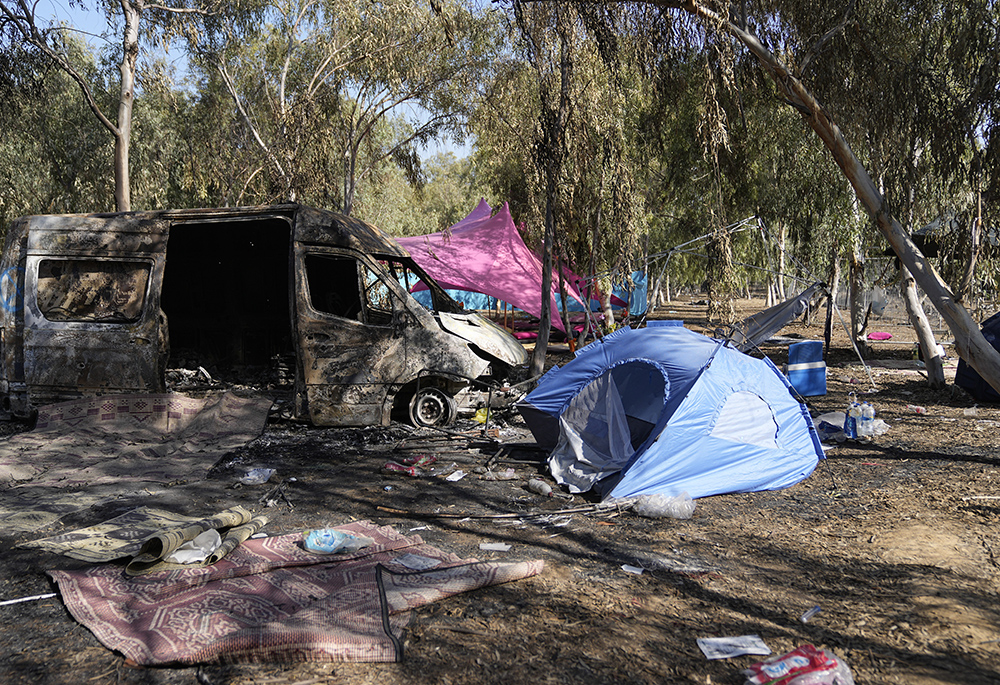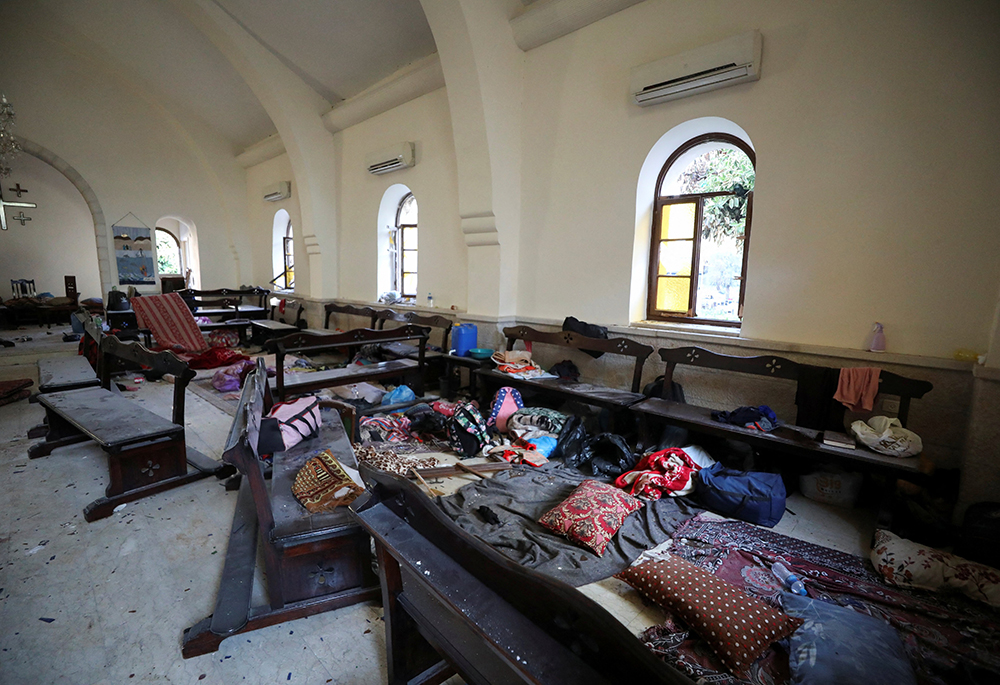
Tents, debris and a burned out van are scattered about the site of a music festival near the border with the Gaza Strip in southern Israel on Oct. 12. At least 260 Israeli festival-goers were killed during the attack by Hamas gunmen on Oct. 7. (AP/Ohad Zwigenberg)
"We must love one another or die."
The poet W.H. Auden wrote that in "September 1, 1939," his poem named for the day Hitler's troops stormed into Poland and triggered World War II.
Now, 84 years later, Hamas invades Israel and, in a frenzy of terror, butchers at least 260 people at a music festival. Israel strikes back with force squared. Meanwhile, Russia — a year into the biggest European war since World War II — continues to bomb Ukraine into an empty lot, and Congress does nothing but act like middle schoolers in a playground fight. Nobody knows how all this will end. No one can tell me what it all means.
After the attack, later on TV I saw a photo of a baby's burned body.
How am I supposed to understand all this?
Especially at the end of what was a beautiful day.
I was driving home from CVS with the window open, a warm breeze brushing my face. I felt as carefree as I did when driving around in my first car, a flashy old Chevy, in the 1960s. I stopped at a red light, and turned my head toward the SUV at my side, a little girl in the backseat with her face against the window, her mother relaxed behind the wheel. I waved and smiled at both of them. They returned the favor. And we all smiled even more. Have you noticed, whenever you smile and say hello to somebody, they will smile back and say hello to you? Louis Armstrong was right, "What a wonderful world, oh yeah!"
It was one of those days when I just wanted to hug everybody. A meme from the Scottish poet Donna Ashworth had appeared on my Facebook that morning. It was called "Good":
Most people are good. Most people kiss their pets goodbye and read "just one more" bedtime story to their children. Most people visit their grandparents even when they have no time, and stop by to check on quiet friends, after a day too long and draining. Most people return their shopping trolleys, despite being already late, and let someone with only one item jump to the front of a queue. Most people give money when money is scarce and most people worry about people they don't even know, day in and day out. When the world seems bad, remember, most people are good.
Then I got home, and put on the news.
And was knocked cold by the image of an infant's blackened remains.
Who does these things? How can anyone do these things? And did this too happen on a beautiful day?
I turned off the TV.
Advertisement
What's it all about? How did we get here? And how do we make our way back to Eden?
We find ourselves stumbling in a dualistic world of good and evil, of unconditional caring and uncommon cruelty; an inexplicable world of mystics and monsters, bullets and butterflies. The 19th-century Catholic poet Francis Thompson marveled "at all the sadness in the sweet, the sweetness in the sad."
Terrence Malick, a poet of film, has made an astonishingly beautiful movie called "A Hidden Life" that shows our dualistic world in all its grandeur and all its horror. It's the story of Franz Jägerstätter, the Austrian farmer who was beheaded for refusing to serve in Hitler's army. On the surface the movie is about the cost of conscience, but the subtext is the durability of love. There is a scene at the end when Jägerstätter's widowed wife Fani, mud-soaked and sweaty, rests near a river with her sister after pulling a plow all day because their ox has died and their neighbors have abandoned them. Her little girls play among the snowy edelweiss. They are surrounded by mountains of unsurpassed beauty. Fani slices an apple in half and says, "A time will come when we will know what all this is for."
Julian of Norwich, the 14th-century mystic, often asked God what it all means. One day the voice for God answered, "What, do you wish to know your Lord's meaning in this thing? Know it well, love was his meaning. Who reveals it to you? Love. What did he reveal to you? Love. Why does he reveal it to you? For love. Remain in this, and you will know more of the same. But you will never know different, without end."
We find ourselves stumbling in a dualistic world of good and evil, of unconditional caring and uncommon cruelty; an inexplicable world of mystics and monsters, bullets and butterflies.
Well, now … I was interrupted between this paragraph and the previous one by a knock on my apartment door. I wanted to keep writing but went to the door. It was my neighbor Navi from down the hall. "Mike," she said, "Mel fell down. Please help me."
Navi is a diminutive woman who was once a captain in the Israeli army. She and her husband Mel (not their real names), a bookseller from Brooklyn, have been weathering the slings and arrows that come with age. They've been married, and in love, for 53 years.
Mel lay on his side on the floor of their home office. "I tried," Navi said, "but I can't get him up."
"Not to worry, Navi, I know how to do this. Vickie used to fall."
We turned Mel on his back. I folded his legs up so his feet touched the floor, held both his hands, and instructed Navi to put her hands under his arms. "OK," I said, "now I lift and you pull up." Just like that we had Mel on his feet.
Together we shuffled him over to the sofa like we were all one dance partner, and the three of us sat down. They wanted to express their gratitude by sharing a book of photographs their son made for them after they had visited Israel to see their daughter a few years ago. I sat in the middle and together we looked at pictures of Navi and Mel with their children and their children's children in Tel Aviv, Jerusalem, Caesarea, at the Dead Sea, the Golan Heights, and the Wailing Wall. "Such a beautiful land," Mel said. His eyes also expressed how sad they both were for what was happening to the people there, and what was about to happen to blameless people in Gaza.

Personal items litter the pews inside a damaged church Oct. 18, located within the premises of the CNEWA-supported al-Ahli Arab Hospital in Gaza City, following a deadly explosion the previous day where hundreds of people were likely killed. (OSV News/Reuters/Mohammed Al-Masri)
As I was leaving, I passed their bathroom and noticed a handicap chair in their shower. "Navi, may I see?" Mel was as short as she was, and the chair looked tall. "Can you get him on that OK?" I asked.
"I manage," Navi said.
"I've got one in my closet that I used for Vickie that's a little smaller, I think. May I go and get it?"
It was two inches lower. "You can keep it if you want. It might be easier."
"Thank you," she said. "You help us so much."
"You help me, too."
"You help us more."
"That's not true."
We hugged and I left and here I am finishing my article. Auden was right: "We must love one another or die." Perhaps the answer to what all of this is for is hidden in the common saying adapted from the Talmud: "Whoever saves one life, saves the entire world."
How do we begin our journey back to Eden? Maybe it's as simple and profound as just opening the door when our neighbor knocks.






